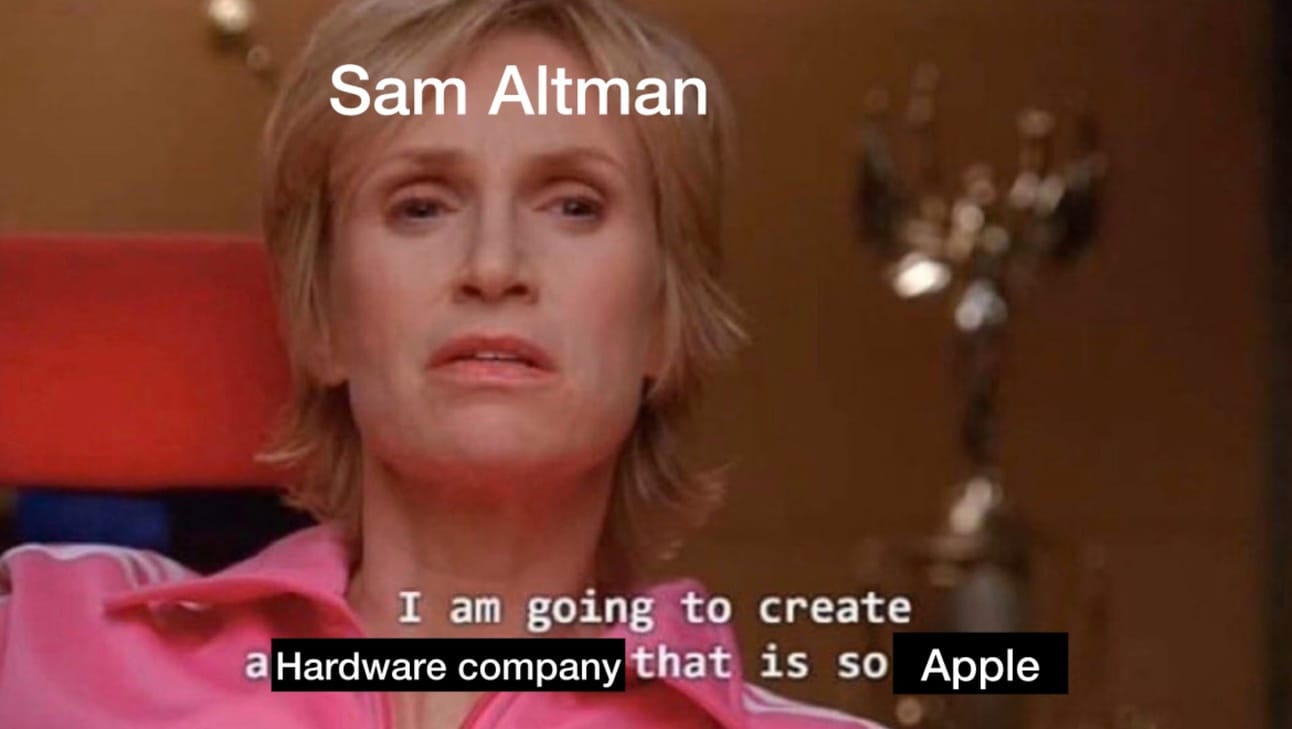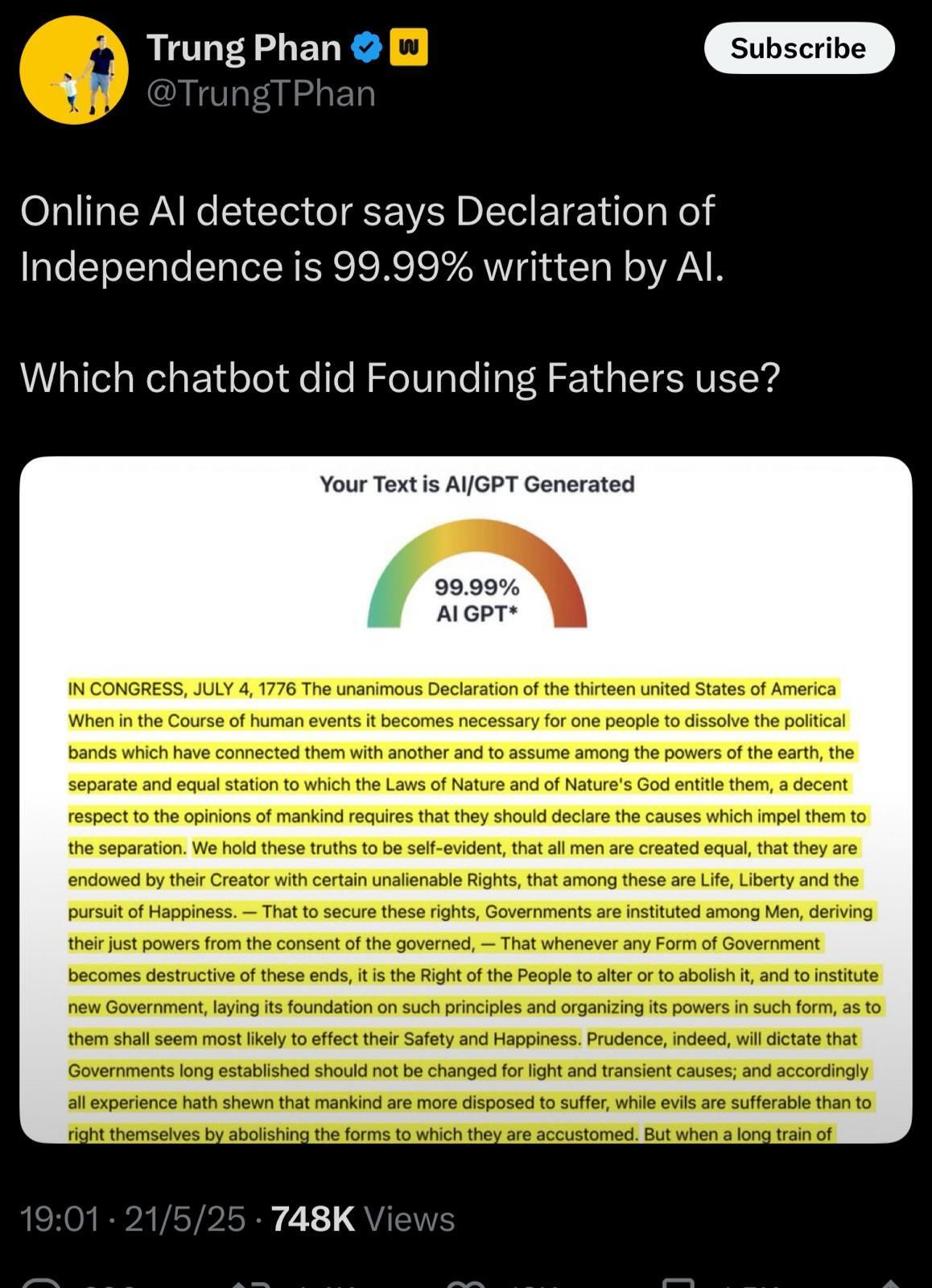Smarter Investing Starts with Smarter News
The Daily Upside helps 1M+ investors cut through the noise with expert insights. Get clear, concise, actually useful financial news. Smarter investing starts in your inbox—subscribe free.

Greetings, lovely people.
We’re now firmly into the thousands of you reading these every week. We are eternally grateful for your readership.
If you have some friends whom you (mercifully) haven’t told about us yet, go and do it now.
But first, let’s get you your weekly roundup of the business and politics news you need to know from the UK and beyond, delivered in meme form.
⏰ Today's reading time is 5 minutes
Quote of the Week
“Get your facts first, then you can distort them as you please.”
UK strikes EU trade and defence reset in new era for relations

The UK government continued it’s hot streak of trade deals, striking a new trade deal with the EU—its third major agreement in recent months.
The EU will ease export controls on UK animal and plant products under a new sanitary and phytosanitary (SPS) agreement. With UK meat exports to the EU having dropped by a third since 2019, this could help reverse some of the economic damage from Brexit-era trade barriers.
In exchange, the UK will allow EU fishing fleets to access British waters until 2038—an extension secured after heavy lobbying from France.
In response to the concession, Brexiteers magically turned into impassioned experts on the dynamics of the British-European fishing industries, criticising the deal as a betrayal to British “Fishers” (you can’t say fisher-man anymore apparently).

While the fishing industry represents a tiny sliver of the UK economy—a mighty 0.03% of GDP and about 10,000 jobs—it remains symbolically potent.
Critics argue the government has thrown fishermen overboard under the bus to secure broader gains. Meanwhile, to maintain access to the EU market, British producers will need to comply with EU standards— creating more accusations of sovereignty erosion.
The agreement also opens doors for people. UK citizens may soon be able to use e-gates at EU airports, pending national approval.
A youth mobility scheme is under discussion, and the UK could even rejoin the Erasmus programme, meaning European capitals of culture will be able to witness the joys of rowdy, drunk British students in the wild once again.
British firms like BAE will also get access to EU defence contracts and funding, bolstering the UK arms sector, which employs 164,000 people and ranks seventh globally.
Funnily enough, weapons tend to take precedence over fish.
OpenAI to buy AI device startup from Apple veteran Jony Ive for $6.5 billion

Sir Jony Ive, the legendary designer behind Apple’s most iconic products like the iPhone, iMac, and iPad, is joining OpenAI in a $6.5 billion deal that includes the acquisition of his startup, io.
He’s the guy from the Apple product videos that would describe in a smooth, ASMR English accent how meticulously they had designed the latest iPhone (before having it assembled by a 6 year old in China).
OpenAI CEO Sam Altman called Ive “the greatest designer in the world” and expressed excitement about building a new generation of AI-powered computing devices together.
Judging by the photo from the press release, it also looks like they are getting married and will use the picture for the RSVP cards.

Sam & Jony cordially invite you…
Ive will take on major design and creative responsibilities, aiming to reimagine how humans interact with AI through bespoke hardware.
He and Altman believe their collaboration could succeed where others have failed, pushing beyond software to create devices that fully integrate artificial intelligence.
The partnership builds on two years of quiet collaboration between OpenAI and LoveFrom, Ive’s design firm. Altman has already tested a prototype and described it as potentially “the coolest piece of technology” ever.
Apple shares dropped over 2% following the announcement, underlining his lasting influence.
Steve’s turning over in the grave…
Vatican positions itself as a possible mediator in the Russia-Ukraine war

Just days after his election, Pope Leo XIV—the first American pope—signaled a bold shift in Vatican diplomacy by offering the Holy See as a venue for peace talks in global conflict zones.
The Vatican has a track record of brokering conflicts, dating back all the way to the good ol’ days when Britain and French were consistently at each other’s throats.
“History doesn’t repeat, but it rhymes.”
His call for dialogue was quickly echoed by world leaders. On May 18th, he met privately with Ukrainian modestly successful comedian President Zelenskyy and welcomed US mascara brand ambassador Vice President J.D Vance, who all expressed support for negotiations.
Given the latter’s track record with his predecessor, Leo made sure to wash his hands afterwards.
Later that day, Vance and Zelenskyy held talks focused on a potential cease-fire, with the Vatican increasingly seen as a neutral broker.
Following a call between Donald Trump and Vladimir Putin, European leaders rallied behind a coordinated push for peace. Italian PM Giorgia Meloni soon contacted the pope, who confirmed he would host negotiations at the Vatican.
Though momentum is building, major obstacles remain. Moscow’s ties with the Vatican are strained, and the Russian Orthodox Church remains a vocal supporter of the war.
Yet Leo XIV’s initiative represents a fresh diplomatic opening— use the Vatican as a base for diplomatic negotiations, as opposed to a base for molesting children or laundering money.
Klarna doubles losses in first quarter as IPO remains on hold

Klarna, the Swedish buy-now-pay-later (BNPL) fintech giant once praised for its aggressive embrace of AI, is now quite firmly in the shit.
The losses come just weeks after Klarna paused its long-anticipated US IPO, previously valuing the company at over $15 billion.
The company posted a $99 million net loss in Q1 2025—more than double its $47 million loss a year earlier—driven by a 17% year-on-year rise in credit losses, now at $136 million.
The surge in defaults, especially among Klarna’s largely Gen-Z and millennial users, reflects growing consumer strain and economic uncertainty. It turns out, letting people spread their Chinese takeaway across 4 easy payments of $4.99 with an exorbitant interest rate may not have been the best move.
CEO Sebastian Siemiatkowski, who once bragged about replacing 700 employees with AI and not hiring anyone in a year, recently “softened” his stance, admitting “there will always be a human if you want” in customer service.
It turns out that going “AI first” may sound great on an earnings call, but on the ground customers still value human interaction.
With rising defaults and steady costs— due to retaining more human staff than expected— Klarna may be a canary in the economic coal mine, signaling another rough patch ahead for consumers and the companies that rely on them.
UK’s 50 richest families hold more wealth than 50% of population

A new report by the Equality Trust reveals that the UK’s wealth inequality has reached staggering levels, with the 50 richest families now holding more wealth than the poorest half of the population—over 34 million people.
Billionaire wealth has surged more than 1,000% in the past 35 years, driven not by innovation or wages but by extractive means such as rising property values and rent increases. These trends, critics argue, allow the ultra-wealthy to profit directly from the UK’s housing crisis and cost-of-living struggles.
Before the trickle-down economics brigade start to get all pissy, it’s crucial to point out that this wealth is increasingly being accumulated passively, through ownership of assets rather than active income or entrepreneurship.
A person with £1 billion in assets, for instance, can earn around £40 million annually without lifting a finger—an imbalance that fuels resentment, doesn’t actually contribute much to the economy and erodes trust in political institutions.
Voices across business, civil society, and academia are calling for reform, including wealth taxation and stronger regulation of political influence.
It’s a fine line to balance, as the UK already has the 2nd highest rate of millionaire exodus in Europe, leading to a loss of any tax income they would have contributed and making the fiscal hole bigger than it already is.
UK net migration in 2024 almost halves to 431,000

Net migration to the UK nearly halved in 2024, dropping to 431,000 from 860,000 the previous year—the largest numerical decline on record, according to the Office for National Statistics.
The fall was largely due to fewer arrivals on work and study visas, a reduction in dependents accompanying those migrants, and the departure of many international students who came after COVID restrictions were lifted.
The decrease follows tighter immigration rules introduced by the previous Conservative government, particularly efforts by former Home Secretary James Cleverly to limit the number of student dependents.
He and other Conservative figures, including Kemi Badenoch, claimed credit for the fall, though Labour's Home Secretary Yvette Cooper cited recent policy shifts and a 300,000 net migration drop since Labour took office.
She also highlighted faster asylum claim processing, increased deportations, and a reduction in the number of asylum seekers housed in hotels.
The usual toddler-esque political pissing contest basically.
Critics such as Reform UK leader Toady McToadface Nigel Farage, argued that numbers remain too high, while Oxford University’s Migration Observatory noted that the steep drop was mainly due to unusually high figures in 2023.
Their analysis suggests the recent decline will have limited economic impact, as most affected migrants were neither high earners nor major burdens on public services.
🍻Half Pints
Quick-fire news you might have missed
Memes of the Week


Resignation of the Week
Japanese farm minister Taku Eto resigned on Wednesday after saying “he’d never had to buy rice himself.” This triggered an outrage in Japan as they are in the middle of a severe cost of living crisis.
What Next?
Fact-based news without bias awaits. Make 1440 your choice today.
Overwhelmed by biased news? Cut through the clutter and get straight facts with your daily 1440 digest. From politics to sports, join millions who start their day informed.
That’s all for today.
We’ll be back, bigger and better, next week.
Our mission is to carefully create, curate and craft the best memes to help you get up to speed with what’s happening in the world and have a few laughs whilst doing so.
We’re always open to feedback on improving the email, so let us know what you think in the poll below.
How was it for you?
Thanks to Jeff and Gabriel






